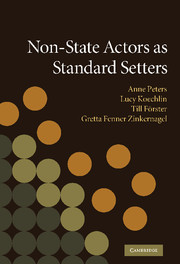Book contents
- Frontmatter
- Contents
- List of figures
- List of tables
- List of contributors
- Acknowledgements
- List of abbreviations
- Preface
- 1 Non-state actors as standard setters: framing the issue in an interdisciplinary fashion
- PART I New actors and processes in contemporary standard setting
- PART II The legitimacy and accountability of actors and standards
- PART III The authority and effectiveness of actors and standards
- 13 Standard setting for capital movements: reasserting sovereignty over transnational actors?
- 14 Certification as a new private global forest governance system: the regulatory potential of the Forest Stewardship Council
- 15 Private standards in the North – effective norms for the South?
- 16 International corporate social responsibility standards: imposing or imitating business responsibility in Lithuania?
- 17 Legal pluralism under the influence of globalisation: a case study of child adoption in Tanzania
- 18 Towards non-state actors as effective, legitimate, and accountable standard setters
- Index
- References
18 - Towards non-state actors as effective, legitimate, and accountable standard setters
from PART III - The authority and effectiveness of actors and standards
Published online by Cambridge University Press: 06 January 2010
- Frontmatter
- Contents
- List of figures
- List of tables
- List of contributors
- Acknowledgements
- List of abbreviations
- Preface
- 1 Non-state actors as standard setters: framing the issue in an interdisciplinary fashion
- PART I New actors and processes in contemporary standard setting
- PART II The legitimacy and accountability of actors and standards
- PART III The authority and effectiveness of actors and standards
- 13 Standard setting for capital movements: reasserting sovereignty over transnational actors?
- 14 Certification as a new private global forest governance system: the regulatory potential of the Forest Stewardship Council
- 15 Private standards in the North – effective norms for the South?
- 16 International corporate social responsibility standards: imposing or imitating business responsibility in Lithuania?
- 17 Legal pluralism under the influence of globalisation: a case study of child adoption in Tanzania
- 18 Towards non-state actors as effective, legitimate, and accountable standard setters
- Index
- References
Summary
The three parts of this book have dealt with our lead questions on non-state standard setting: How can the relevant actors and processes be described and mapped? By what authority do they set standards? And are the processes and their outcome, the standards, effective and legitimate?
The chapters comprised in this volume explore different facets of standard setting, some looking at these questions from a more theoretical perspective, some discussing concrete case studies in various fields. Given the diversity of actors and the diversity of standard-setting processes, no single set of necessary and sufficient conditions for guaranteeing the legitimacy, accountability, and effectiveness of non-state standard setting could be identified. However, the importance of inclusiveness, transparency, and procedural safeguards has emerged as a common theme. Moreover, all chapters taken together have made it abundantly clear that the phenomenon of non-state standard setting forces us to question four boundaries which are used in legal, sociological, and political analysis: the boundaries between law and non-law, between the public sphere and the private sphere, between public law and private law, and between international, national, and local law.
Actors and processes
The role of NGOs in standard setting
The case studies in this book have illustrated how NGOs participate in global standard setting. In a legal perspective, we can distinguish various types of standards and corresponding different types of NGO involvement.
- Type
- Chapter
- Information
- Non-State Actors as Standard Setters , pp. 492 - 562Publisher: Cambridge University PressPrint publication year: 2009
References
- 9
- Cited by

